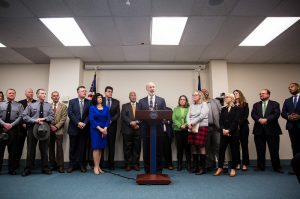When Pennsylvania lawmakers passed the Clean Slate Act last summer, the first-of-its kind legislation promised that just because someone commits a crime, that doesn’t have to mean they automatically retain the label of criminal for the rest of their lives.
Now, as the first provisions of the law go into effect, Gov. Tom Wolf and the bipartisan coalition of lawmakers who conceived it are encouraging anyone in Pennsylvania who may be eligible under its provisions to take advantage by visiting an information website, mycleanslatepa.com.
Broadly, the law allows anyone who has a low-level criminal offense on their record to seek to have that legal proceeding sealed. The idea is that these offenses would not show up on background checks, theoretically making it easier for rehabilitated citizens to find employment, get housing and otherwise go about their lives without the permanent stain of long-ago transgressions.
To be eligible, the offense has to have taken place more than 10 years ago, meet a set of criteria that establish whether it was considered to be nonviolent, and all court costs and restitution must be fully paid. The individual must not have any newer convictions on their record, either.
The aspects of the law that went into effect in late December allow anyone who meets the requirements to appeal to the courts to have those records sealed. Starting in June – the delay allows legal systems across the state time to comply – many of the qualifying offenses will automatically be sealed.
At a news conference last week exhorting those who may qualify to access the information website, state Rep. Sheryl Delozier, R-Camp Hill, talked about how the backers of the bill worked at length to make sure that anyone who might have an opinion on the legislation had a chance to weigh in and make suggested changes.
“If you take a look at how this law came into play, not only did we deal with the chambers [of commerce] and the unions and the employee groups – and the employer groups, and the law groups with the [district attorneys], and the [Fraternal Order of Police] and the police,” she said. “We were able to deal with so many groups that so many times are on opposite sides of issues and bring them together on this issue.”
Delozier and Wolf both noted that the Clean Slate Act passed unanimously in the state Senate and with only two opposing votes in the state House of Representatives. State Rep. Jordan Harris, D-Philadelphia, said that the law was as much about the economic impact as the criminal justice ramifications.
“Listen, it’s real simple,” Harris said. “This is a jobs bill. This is about getting people back to work. You can’t lift people out of poverty if they can’t become gainfully employed. It’s just that simple.”
Wolf echoed that thinking, emphasizing that with many companies in Pennsylvania seeing a shortage of workers because of relatively low unemployment rates, helping those who had paid their penance fully re-enter the workforce could have a significant boost. And the business community’s support for the bill was evident through the presence at the news conference of Gene Barr, president and CEO of the Pennsylvania Chamber of Business and Industry, who was an advocate of the bill as it moved through the legislative process.









